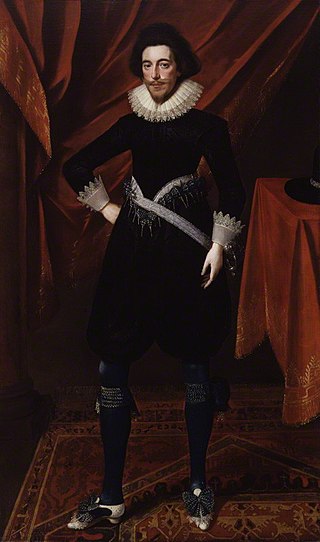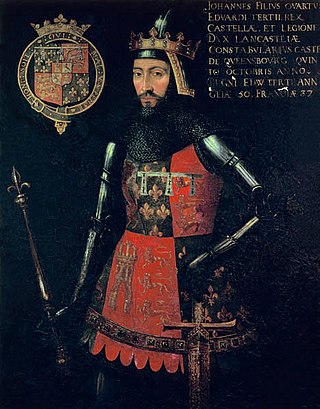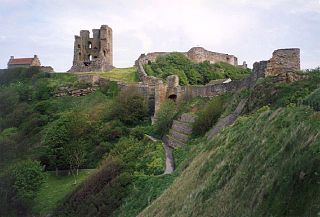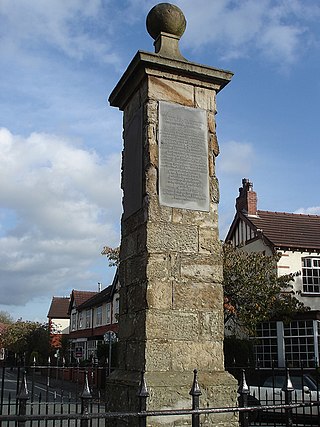
The Battle of Marston Moor was fought on 2 July 1644, during the Wars of the Three Kingdoms of 1639–1653. The combined forces of the English Parliamentarians under Lord Fairfax and the Earl of Manchester and the Scottish Covenanters under the Earl of Leven defeated the Royalists commanded by Prince Rupert of the Rhine and the Marquess of Newcastle.

The Battle of Worcester took place on 3 September 1651 in and around the city of Worcester, England and was the last major battle of the 1639 to 1653 Wars of the Three Kingdoms. A Parliamentarian army of around 28,000 under Oliver Cromwell defeated a largely Scottish Royalist force of 16,000 led by Charles II of England.

Robert Devereux, 3rd Earl of Essex, KB, PC was an English Parliamentarian and soldier during the first half of the 17th century. With the start of the Civil War in 1642, he became the first Captain-General and Chief Commander of the Parliamentarian army, also known as the Roundheads. However, he was unable and unwilling to score a decisive blow against the Royalist army of King Charles I. He was eventually overshadowed by the ascendancy of Oliver Cromwell and Thomas Fairfax, and resigned his commission in 1646.

The New Model Army or New Modelled Army was a standing army formed in 1645 by the Parliamentarians during the First English Civil War, then disbanded after the Stuart Restoration in 1660. It differed from other armies employed in the 1639 to 1653 Wars of the Three Kingdoms in that members were liable for service anywhere in the country, rather than being limited to a single area or garrison. To establish a professional officer corps, the army's leaders were prohibited from having seats in either the House of Lords or House of Commons. This was to encourage their separation from the political or religious factions among the Parliamentarians.

}} Sir Hardress Waller, c. 1604 to – 1666, was born in Kent and settled in Ireland during the 1630s. A first cousin of Parliamentarian general William Waller, he fought for Parliament in the Wars of the Three Kingdoms, becoming a leading member of the radical element within the New Model Army. In 1649, he signed the death warrant for the Execution of Charles I, and after the Stuart Restoration in 1660 was condemned to death as a regicide.

Sir John Gell, 1st Baronet was an English landowner from Derbyshire, who acted as local Parliamentarian commander for most of the First English Civil War before resigning in May 1646. He was notorious for parading the body of his Royalist opponent through Derby after the Battle of Hopton Heath in March 1643.

Colonel John Hewson, also spelt Hughson, was a shoemaker from London and religious Independent who fought for Parliament and the Commonwealth in the Wars of the Three Kingdoms, reaching the rank of colonel. Considered one of Oliver Cromwell's most reliable supporters within the New Model Army, his unit played a prominent part in Pride's Purge of December 1648. Hewson signed the death warrant for the Execution of Charles I in January 1649, for which he reportedly sourced the headsman, while soldiers from his regiment provided security.

Colonel John Birch was an English soldier and politician from Manchester, who fought for the Parliamentarian cause in the First English Civil War, and sat in the House of Commons at various times between 1646 and 1691.
The Eastern Association of counties was an administrative organisation set up by Parliament in the early years of the First English Civil War. Its main function was to finance and support an army which became a mainstay of the Parliamentarian military effort until early 1645. In January 1644 committeemen of the Eastern Association gathered at the Bury Conference to discuss their concerns as regards the proposed New Model Army. However in the following months many of its units were incorporated into this new military formation.
The Storming of Bolton, sometimes referred to as the "Bolton massacre", was an event in the First English Civil War which happened on 28 May 1644. The strongly Parliamentarian town was stormed and captured by Royalist forces under Prince Rupert. It was alleged that up to 1,600 of Bolton's defenders and inhabitants were slaughtered during and after the fighting. The "massacre at Bolton" became a staple of Parliamentarian propaganda.

The High Sheriff of Lancashire is an ancient officer, now largely ceremonial, granted to Lancashire, a county in North West England. High Shrievalties are the oldest secular titles under the Crown, in England and Wales. The High Sheriff of Lancashire is the representative of the monarch in the county, and is the "Keeper of The King's Peace" in the county, executing judgements of the High Court through an Under Sheriff.

James Berry, died 9 May 1691, was a Clerk from the West Midlands who served with the Parliamentarian army in the Wars of the Three Kingdoms. Characterised by a contemporary and friend as "one of Cromwell's favourites", during the 1655 to 1657 Rule of the Major-Generals, he was administrator for Herefordshire, Worcestershire, Shropshire and Wales.

Booth's Uprising, also known as Booth's Rebellion or the Cheshire Rising of 1659, was an unsuccessful attempt in August 1659 to restore Charles II of England. Centred on North West England and led by George Booth, it took place during the political turmoil that followed the resignation of Richard Cromwell as head of The Protectorate.

Robert Venables, was an English soldier from Cheshire, who fought for Parliament in the 1638 to 1651 Wars of the Three Kingdoms, and captured Jamaica in 1655.

Colonel John Pickering, baptised 3 December 1615, died 24 November 1645, was a member of the landed gentry from Northamptonshire who served with the Parliamentarian army in the First English Civil War. Like his elder brother Sir Gilbert Pickering, a close ally of Oliver Cromwell, he was a religious Independent, known for his devout faith and radical views. Appointed colonel of an infantry regiment in the New Model Army, he died of fever at Ottery St Mary on 24 November 1645.

Colonel Nathaniel Rich was a member of the landed gentry from Essex, who sided with Parliament during the Wars of the Three Kingdoms and was "an example of those pious Puritan gentlemen who were inspired by the ideals of the English Revolution". Appointed a colonel in the New Model Army in 1645, then elected MP for Cirencester in 1648, he was a close associate of Oliver Cromwell until the two fell out due to his association with the Fifth Monarchists, a radical religious group that opposed the latter's appointment as Lord Protector in 1653.

The Battle of Burton Bridge was fought between Royalist and Parliamentarian forces at Burton upon Trent on 4 July 1643 during the First English Civil War. By the time of the battle, the town, which had at various times been held by both sides, was garrisoned by a Parliamentarian unit under the command of Captain Thomas Sanders and the town's military governor, Colonel Richard Houghton. The key river crossing at Burton was desired by Queen Henrietta Maria, who was proceeding southwards from Yorkshire with a convoy of supplies destined for King Charles I at Oxford. The Royalists, led by Colonel Thomas Tyldesley, launched a cavalry charge across the bridge which succeeded in defeating the Parliamentarians and capturing most of their officers, including Sanders and Houghton. The Queen's convoy proceeded on its way south to Oxford, with Tyldesley receiving a knighthood and a promotion in recognition of his victory. Burton changed hands several more times during the course of the war, before finally coming under Parliamentarian control in 1646.

Sir Gilbert Hoghton, 2nd Baronet was an English politician who sat in the House of Commons variously between 1614 and 1640. He was a Royalist leader during the English Civil War.

The Battle of Winnington Bridge, often described as the last battle of the English Civil War, took place on 19 August 1659 during Booth's Uprising, a Royalist rebellion in north-west England and Wales.




















